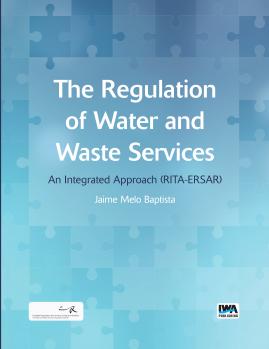 |
The Regulation of Water and Waste Services:
The Regulation of Water and Waste Services:

The public water supply, urban wastewater and urban waste management services are essential to the well-being of citizens, public health and economic activities. These are generally provided under natural or legal monopoly, so there is no incentive for utilities to search for greater efficiency and effectiveness and as such there is an increasing prevalence of such risks for users. For these reasons, society can significantly benefit from the existence of regulatory intervention capable of introducing greater balance in the relationship between utilities and their users.
The Regulation of Water and Waste Services: An Integrated Approach (Rita-Ersar) presents a practical integrated regulatory approach to these water and waste services. This approach is called the ARIT-ERSAR model and it is capable of contributing to the promotion of access by citizens to these services that is tending towards the universal. These services are provided with suitable quality by utilities at socially acceptable prices and with an acceptable level of risk.
This approach consists of a regulation model with two major areas of intervention: structural regulation of the sector and regulation of the performance of the utilities. The components of structural regulation are contributions to organisation, legislation, information and sectoral capacity building. The performance regulation of utilities consists of legal and contractual regulation, economic regulation, quality of service regulation, drinking water quality regulation and user interface regulation.
Contents
Introduction; Water and Waste Services; Public Policies for Water and Waste Services; Setting up a Regulatory Authority; Integrated Regulatory Approach; Regulatory Contribution to Sectoral Organisation; Regulatory Contribution to Sectoral Legislation; Regulatory Contribution to Sectoral Information; Regulatory Contribution to Sectoral Capacity Building; Legal And Contractual Regulation; Economic Regulation; Quality of Service Regulation; Drinking Water Quality Regulation; User Interface Regulation; Articulation with Third Party Entities; Conclusions
Author: Jaime Melo Baptista, Chairperson of the Water and Waste Services Regulatory Authority, ERSAR, Portugal
Also available as part of your Water Inteligence Online subscription
Publication Date: 15/10/2014ISBN13: 9781780406527eISBN: 9781780406534Pages: 237 |
Print:
|